|
|
|
Sort Order |
|
|
|
Items / Page
|
|
|
|
|
|
|
| Srl | Item |
| 1 |
ID:
189251


|
|
|
|
|
| Summary/Abstract |
Japan-South Korea relations have consistently been presented by International Relations scholars as a puzzle that confounds mainstream rationalist theories, which struggle to explain the consistent acrimony associated with the so-called ‘history problem’. While many scholars have, therefore, adopted conventional constructivist approaches to incorporate history into their analyses, such literature often neglects the processes of (re)construction of this social reality, thereby implicitly treating these negative sentiments as essentialised elements of Korean and Japanese culture/identity which cause certain foreign policies. Using the recent Japan-South Korea trade dispute as a case study, this article instead draws on critical constructivist/poststructuralist theory and discourse analytical methods to examine how the ‘history problem’ is produced and reproduced. It argues that dominant discourses of remembering in South Korea, which represent Japan as an unrepentant colonial aggressor, and of forgetting in Japan, which represent South Korea as emotional and irrational for dwelling on the past, act to (re)produce identities that clash in their attitudes to difficult history. While such foreign policy practices (re)produce dominant national identities, these identities also shape the bounds of which foreign policies are legitimate or imaginable. This mutually constitutive relationship between identity and foreign policy continually reproduces the ‘history problem’ in Japan-South Korea relations.
|
|
|
|
|
|
|
|
|
|
|
|
|
|
|
|
| 2 |
ID:
138934


|
|
|
|
|
| Summary/Abstract |
This article proceeds from a photograph. It does so to begin an investigation of the diverse sites within and beyond it, and the reflections of several enactments of nation, culture, belonging and non-belonging. The image in question depicts a group of children waving flags. It is an old photograph, possibly removed from our ‘present’, though it holds within it multi-temporal spaces into which we might enter. The aim of this article is to do just that – to enter the image, armed with all the things a researcher gathers in terms of background data, narratives and contexts, and examine the complex negotiations enacted within and beyond it. How does this group of flag-waving children impact on us today? This article explores the extent to which an understanding of a temporal enactment of nation in displacement might reflect on contemporary negotiations of citizenship, culture and representation.
|
|
|
|
|
|
|
|
|
|
|
|
|
|
|
|
| 3 |
ID:
186196
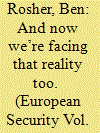

|
|
|
|
|
| Summary/Abstract |
Though conspicuous by its absence in debates among the British political and media establishments during the EU referendum campaign, the Irish border has been the central feature of Brexit as the implications and complications of trying to “take back control of borders” have become apparent. Drawing on focus group data gathered between 2017 and 2019 I employ ontological security theory to investigate the impact that Brexit is having on residents and communities living in the central Irish border region. In particular, I draw on the work of David Carr to explore the social role of memory and narrative in ontological (in)security and how this has manifested in the border region throughout the Brexit process. I find that the uncertainties generated by Brexit have caused border residents to draw on anxiety-filled memories and narratives from the securitised border of the pre-Good Friday Agreement era which they then project onto and vicariously through the next generation who, in turn, embody these anxieties, creating intergenerational ontological insecurity. Brexit has reintroduced, if not the physical border, the psychological borders of the past.
|
|
|
|
|
|
|
|
|
|
|
|
|
|
|
|
| 4 |
ID:
099932
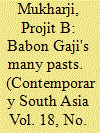

|
|
|
|
|
| Publication |
2010.
|
| Summary/Abstract |
Babon Gaji is a curious god. He is avowedly a Muslim, and the icons that represent him seek to capture his 'Muslim-ness' conspicuously in their attire, not to mention the name itself (Gaji = Ghazi = Muslim warrior-monk) and local lore. Yet he is worshipped by Brahmin Hindu priests who are equally conspicuous in flaunting their Hindu-Brahmin identity. There are no stories about the Gaji ever having been a Hindu or having had anything more than an intellectual interest in Hinduism. He remains, thus, in his afterlife a Muslim; yet, he receives worship through Brahmin priests. Both Hindus and Muslims come to him in large numbers today, in search of a cure for their afflictions. Local accounts place the origins of his shrine at Tajpur, South 24 Parganahs a little over 100 years ago, yet, no account of either the cult or the shrine - to the best of my knowledge - exists in the colonial archive. Neither are there any known written accounts outside the colonial archive that are more than a couple of decades old. For the historian of colonial medicine in the region, therefore, the Gaji presents a difficult challenge.
|
|
|
|
|
|
|
|
|
|
|
|
|
|
|
|
| 5 |
ID:
160615
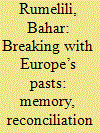

|
|
|
|
|
| Summary/Abstract |
The European Union is widely credited for consolidating a democratic “security community” in Europe, and bringing about a definitive break with war-torn and authoritarian/totalitarian pasts in many European countries. Drawing on recent discussions in ontological security studies, this article points out that these radical breaks may have come at the expense of ontological insecurity at the societal and individual levels in Europe. While conventional teleological narratives often treat reconciliation and breaking with the past as automatic by-products of European integration, ontological security theory calls for greater attention to the societal tensions and anxieties triggered by these transformations and how they are being managed –more or less successfully – through reconciliation dynamics and memory politics in different societal settings. Illustrating the variation in a number of cases, this article claims that a systematic comparative analysis of the different dynamics of reconciliation and memory politics in different European societies is central to analyzing European integration from an ontological security perspective.
|
|
|
|
|
|
|
|
|
|
|
|
|
|
|
|
| 6 |
ID:
146535
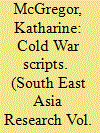

|
|
|
|
|
| Summary/Abstract |
This paper contributes to a growing field of literature on Cold War culture by comparing struggles over memory in Indonesia and Malaysia of anti-communist repressions. It demonstrates the enduring legacies of the Cold War in these neighbouring countries where the war overlapped directly with experiences of colonization and decolonization. I show how and why anti-communism in both countries became a core foundation of both Malaysian and Indonesian nationalism and related religious identification and how this largely explains successive governments’ attempts to memorialize and defend these repressions. I argue that recent attempts by both survivors of the repression and younger Indonesians and Malaysians to reexamine the history of the political left or experiences of repression constitute important efforts to rethink the postcolonial predicaments of both countries in different ways.
|
|
|
|
|
|
|
|
|
|
|
|
|
|
|
|
| 7 |
ID:
115816
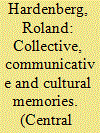

|
|
|
|
|
| Publication |
2012.
|
| Summary/Abstract |
In recent years several historical publications have appeared in Kyrgyzstan which are far from homogeneous in terms of style, form and content. In this article, two very different local histories written by Kyrgyz authors from the same village are analysed and compared. The first author is a former kolkhoz president who produced two books that basically cover the time from the end of the nineteenth to the end of the twentieth century. His work is strongly (auto)biographical and focuses on individual achievements and personal experiences. The second author is a mathematician who wrote two books about the history of his own descent category (uruu). His work combines oral history (sanjyra) with written sources. The two authors create very different images of 'esteemed people' (ardaktuu adamdar), yet they exhibit a common interest in producing a narrative that links the deeds of one's own people (family or descent group) with the history of particular places (pastures, villages or regions). Taking up these observations, the author argues that local histories relate to different types of memory and are far from uniform with regard to their composition, sources, methods and narrative strategies. Yet, despite their diversity, the newly developed genres of 'written collective memory' provide the idea of social continuity by stressing connections between past and present, and between people, land and morality. This may indeed be one reason why collective memories, which were suppressed for many decades, have become so popular in times of rapid social transformation.
|
|
|
|
|
|
|
|
|
|
|
|
|
|
|
|
| 8 |
ID:
141810
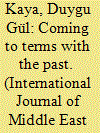

|
|
|
|
|
| Summary/Abstract |
This article examines the growing interest in questions of memory, trauma, and justice in Turkey, with a special focus on the notion of “coming to terms with the past.” Through an analysis of key academic and popular texts published between 2002 and 2013, it argues that “coming to terms with the past” is a therapeutic public discourse that rewrites national history through the temporality of trauma. In other words, this discourse reconfigures the sequence of past, present, and future as the beginning, development, and end of a case of collective trauma, applying the psychotherapeutic terminology of victimhood, healing, and forgiveness to social realities. The article offers new perspective on existing debates over “coming to terms with the past” by analyzing the limits of this therapeutic discourse and by exploring the potential and open-endedness of the politics of memory in Turkey.
|
|
|
|
|
|
|
|
|
|
|
|
|
|
|
|
| 9 |
ID:
137678
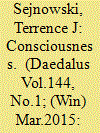

|
|
|
|
|
| Summary/Abstract |
No one did more to draw neuroscientists' attention to the problem of consciousness in the twentieth century than Francis Crick, who may be better known as the co-discoverer (with James Watson) of the structure of DNA. Crick focused his research on visual awareness and based his analysis on the progress made over the last fifty years in uncovering the neural mechanisms underlying visual perception. Because much of what happens in our brains occurs below the level of consciousness and many of our intuitions about unconscious processing are misleading, consciousness remains an elusive problem. In the end, when all of the brain mechanisms that underlie consciousness have been identified, will we still be asking: “What is consciousness?” Or will the question shift, just as the question “What is life?” is no longer the same as it was before Francis Crick?
|
|
|
|
|
|
|
|
|
|
|
|
|
|
|
|
| 10 |
ID:
159390
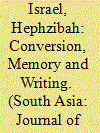

|
|
|
|
|
| Summary/Abstract |
Examining autobiographical statements left by South Asians converting to Christianity from the nineteenth century onwards, this article investigates the function of memory and literary narrative in three features common to several accounts: the translation of conversion accounts; the reconstruction of past events through narrative devices; and the re-formation of the Protestant individual conceived as part of a larger project of ‘reforming’ India as a state of progressive modernity. It argues that personal memory is inflected by conventions of writing about conversion, pressing into service specific tropes to exhibit the convert as ‘Protestant’. This economy of recall allowed converts to participate in wider public debates on religious and social reform by re-enacting conversion and confession in autobiography.
|
|
|
|
|
|
|
|
|
|
|
|
|
|
|
|
| 11 |
ID:
136288
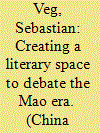

|
|
|
|
|
| Summary/Abstract |
Since the scar literature of the early 1980s, fiction and fictionalised autobiography have played an important role in bringing to light the mass violence of the Cultural Revolution. However, these texts remained within a well-defined framework in which the political system itself was not questioned. Over the last decade, by contrast, the Chinese literary field has focused more specifically on the 1950s, with works such as Yang Xianhui’s Chronicles of Jiabiangou (Tianjin, 2002), and Yang Jisheng’s Tombstone (Hong Kong, 2008). This paper focuses on Yan Lianke’s Four Books (Hong Kong, 2010), a full-fledged fictionalisation in a fantastic mode of the famine of the Great Leap Forward in a village on the Yellow River. Considering literature in the context of theories of the public sphere, it suggests that Yan’s book aims to broaden decisively the discussion on certain previously out-of-bounds aspects of the Mao era, an aim only partially thwarted by its failure to be published within mainland China. Four Books, like Yang Jisheng and Yang Xianhui’s works, thus represents an attempt to call into question the original legitimacy of the PRC polity and to create debate within the Chinese-speaking public sphere on the foundations of the current regime.
|
|
|
|
|
|
|
|
|
|
|
|
|
|
|
|
| 12 |
ID:
092261
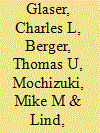

|
|
|
|
|
| Publication |
2009.
|
| Summary/Abstract |
How can Japan put its past behind? Scholars, journalists, and activists frequently argue that Japan cannot solve its "history problem" unless it follows West Germany's lead in offering contrition for World War II violence. Into this debate, Jennifer Lind's Sorry States: Apologies in International Politics offers an original and provocative contribution. Lind argues that while countries should acknowledge past atrocities, frequent public apologies can be domestically polarizing and diplomatically counterproductive. Sorry States outlines a theory of remembrance and threat perception and tests it in a comparative study of Japanese-South Korean and Franco-German relations after World War II. Its methods, data, and findings will interest not only East Asianists, but also scholars of international reconciliation and security studies more broadly. This roundtable presents three critical essays in addition to a response by the author. They discuss the mechanisms through which historical memory influences perceptions of threat, the relative weight of ideational versus material factors in threat perception, and whether changes in international norms and economic interdependence may increasingly pressure countries to confront past violence.
|
|
|
|
|
|
|
|
|
|
|
|
|
|
|
|
| 13 |
ID:
076277
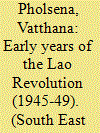

|
|
|
| 14 |
ID:
173882
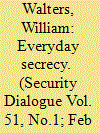

|
|
|
|
|
| Summary/Abstract |
Despite the welcome turn within security studies towards a more material- and practice-oriented understanding of state secrecy, the ways in which security actors experience, practise and negotiate secrecy in their everyday work lives has been rather overlooked. To counter this neglect the article calls for attention to everyday secrecy. Focusing on a former top-secret weapons research facility in the UK called Orford Ness, it uses oral history to give an account of ex-employees’ memories, experiences and practices concerning secrecy. Such a focus reveals that subjects make sense of procedures and rules of secrecy in ways that are sometimes surprising and unexpected. Ultimately this perspective emphasizes that secrecy is not just what governments and organizations prescribe and proscribe; it is also shaped by subjects who negotiate these rules. Everyday secrecy matters: as a perspective it shows that secrecy is not simply imposed by states and organizations from ‘above’; it is also made from ‘below’, albeit very asymmetrically.
|
|
|
|
|
|
|
|
|
|
|
|
|
|
|
|
| 15 |
ID:
152356
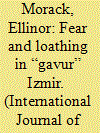

|
|
|
|
|
| Summary/Abstract |
Based on a series of recollections published between January and April 1926 in the Izmir-based daily newspaper Ahenk (Harmony), this article explores how individual Muslim Turks remembered their emotional responses to the Greek occupation of that city (May 1919–September 1922). Analyzing these recollections, it considers why certain events were remembered while others were almost completely left out. By studying how Muslim Turks described their feelings towards the occupying forces, local non-Muslims, and the eventually victorious Turkish army, the article makes an initial contribution to the history of emotions in early republican Turkey. I argue that the composition and consumption of memories were avenues for connecting emotionally to the Turkish nationalist project. This finding challenges the widespread notion that the early republican period was characterized by collective amnesia of the immediate past, and contributes to the growing body of scholarship on popular participation in early republican nationalism.
|
|
|
|
|
|
|
|
|
|
|
|
|
|
|
|
| 16 |
ID:
158102
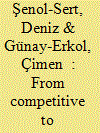

|
|
|
|
|
| Summary/Abstract |
Recent research shows that Turkish society is very polarized and that different identities and ideological perspectives are in constant struggle with each other. In a multicultural society such as Turkey’s, the question of how to think about the relationship between different social groups’ histories of victimization becomes crucial. Following Michael Rothberg’s conceptualization of multi-directional memory – beyond competitive memory, this article presents an archive for comparative work through a data set of novels on the military coups in Turkey. The major argument here is that while these novels are promoting the idea of competitive memory as a zero-sum game, if it is looked at more closely, there are traces of multi-directionality, of ongoing negotiation, cross-referencing, and borrowing. Doing so, it is argued, would help to reframe justice in the society, where different victimizations are not competing with each other, but start to talk to each other. This article is an attempt to create a literary tool of comparison on different stories of victimization as a first step towards transitional justice in a polarized society.
|
|
|
|
|
|
|
|
|
|
|
|
|
|
|
|
| 17 |
ID:
087517
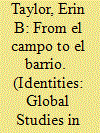

|
|
|
|
|
| Publication |
2009.
|
| Summary/Abstract |
In the social imaginaries of the Dominican Republic, national culture has its origins in el campo, the countryside. Country spaces and country people are viewed as embodying the past in the present, making them authentic contemporary carriers of national culture and moral order. By contrast, the city has long been viewed as the site of a modernity that takes its inspiration from outside of the nation but also as a site of social degeneration. In recent decades, representations of poor barrios as a threat to the city's moral order have intensified in reaction to rising crime rates and a series of economic crises. First generation migrants from the country to the city find that their status as carriers of culture and morality is compromised. They evoke positive memories of their rural pasts to position themselves as moral beings transposed to a corrupt urban milieu. At the same time, they develop urban identities that incorporate aspects of rural life while rejecting others. I argue that migrants' memories of their rural past resist their emplacement while allowing for the transformation of their present structural position.
|
|
|
|
|
|
|
|
|
|
|
|
|
|
|
|
| 18 |
ID:
106040
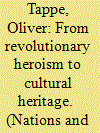

|
|
|
|
|
| Publication |
2011.
|
| Summary/Abstract |
Museum exhibitions in Laos represent two main strands of Lao national identity discourse. First, they glorify the 'liberation struggle' of the so-called 'Lao multiethnic people' under the leadership of the Lao People's Revolutionary Party, and therefore serve as important ideological tools for the current regime's self-legitimisation. Second, they display the history and cultural heritage of the Lao nation, providing the postcolonial state with a narrative of historical continuity and civilisation that is focused mostly on the dominant ethnic Lao culture. This article explores the contradictions within official images of the Lao nation-state and how these opposing strands of national identity compete or interact. Museums as key arenas of ideological tensions constitute illuminating fields of research on discourses of national identity in Laos.
|
|
|
|
|
|
|
|
|
|
|
|
|
|
|
|
| 19 |
ID:
096978
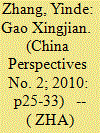

|
|
|
| 20 |
ID:
187287
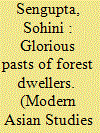

|
|
|
|
|
| Summary/Abstract |
This article discusses the shifts in rights over land of Binjhal Adivasi people in the wake of colonial rule in the ex-zamindari of Borasambar, located in the British Central Provinces in the eventful period from 1860–1926. Oral narratives and documents preserved by Binjhal villagers juxtaposed with archived records of military expeditions, village surveys, administrative letters, and land settlement reports reveal how Binjhal ancestors lost titled land and offices of headmanship, which, over time, impoverished and diminished them in the rural hierarchy. The research finds that the codification of selective custom as legal rights accommodated colonial land policies to promote social change and agricultural improvement. Environmental histories document how nineteenth-century forest enclosures and agrarian order brought Adivasi areas within state control. Revisionist research highlights historically contingent outcomes of colonial rule. The Adivasi pasts in this article reveal how the interpretations of legal culture by local actors, who transacted with the administration, led to variable outcomes for a pre-colonial land-controlling group. By examining the truth claims in fragments of Binjhal voices and narratives about them, in village memories and archives, through a threefold examination of the past—pragmatic, habitual, and episodic—this article explores the historicity of Adivasi land memories. Here, stories of past glory lead to claims of legal entitlements rather than restitution of ancient rule, and injustices are described in the idiom of disrupted kinship and transgressions of women, illuminating the varied routes through which groups residing in relatively non-agrarian upland habitats became Adivasi.
|
|
|
|
|
|
|
|
|
|
|
|
|
|
|
|
|
|
|
|
|